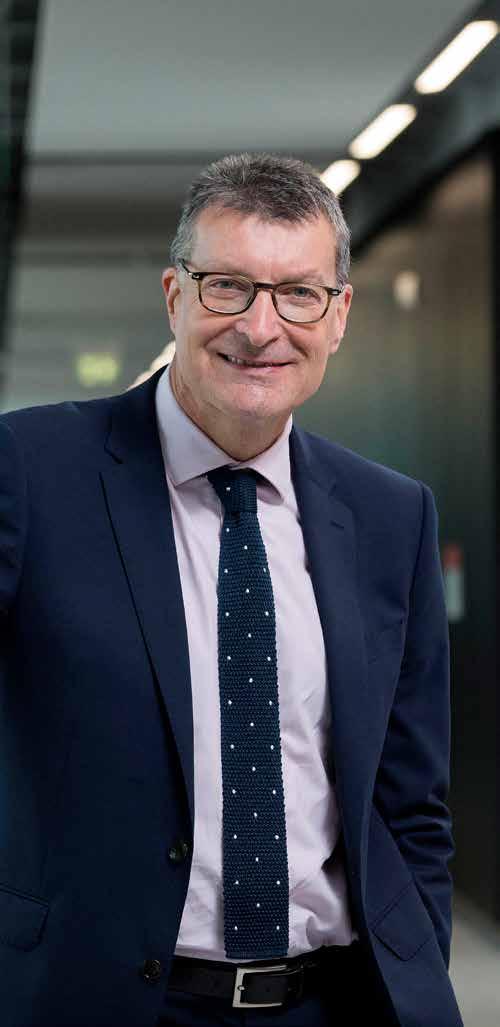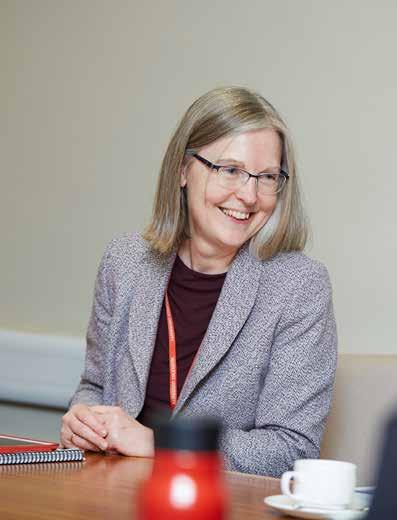
5 minute read
CENTRAL VISION
THEY WERE REMARKABLE
and we’re very proud of what they achieved
THE UNIVERSITY OF CENTRAL LANCASHIRE (UCLAN) IS A MAJOR CONTRIBUTOR OF TALENT INTO THE HEALTHCARE SECTOR, AMONGST OTHER AREAS OF FOCUS. THE SOCIAL MOBILITY PLEDGE SPOKE TO VICE CHANCELLOR GRAHAM BALDWIN ABOUT ITS VITAL ROLE IN THE CORONAVIRUS CRISIS AND ITS ONGOING WORK IN WIDENING ACCESS TO OPPORTUNITIES.
SPOTLIGHT ON GRAHAM BALDWIN AND UNIVERSITY OF CENTRAL LANCASHIRE (UCLAN)
Q// How did the university cope with the original lockdown?

A// We coped remarkably well. I was pleasantly surprised at how we responded. Looking back, it all happened so quickly. We went from planning for beginning to work from home, to leaving campus very suddenly and setting up a remote home working situation that ultimately proved to be very successful. A lot of that was due to the work that we put in as a university and information systems people to develop a culture that was beginning to use technology to a far greater extent to support learning. We had some very interesting data. Suddenly we saw an increase in student attendance at many sessions and during the whole process we’ve seen quite significant improvements in student performance. So actually there is an awful lot for us to learn and as we begin to gradually return to campus, one of the critical bits is how do we take the lessons learned and the good things from that lockdown and ensure that we continue to make progress with the students in the future.
Q//As an institution you train a lot of the people who will go into the healthcare system. Presumably there were students of yours who graduated early to get into those key roles that were really needed at the height of the crisis?
A// Yes this was the other amazing response from the university during that lockdown. We’re the largest provider of students in health and social care in Lancashire and Cumbria and we’re the only modern university with a school of dentistry, medicine and pharmacy; so they were all in extraordinary demand. Both nurses and medics graduated early and were then able to go and support the local trusts. Medical students graduated and within 48 hours, all of them were employed in the East Lancashire Health Trust supporting on the frontline. They were remarkable and we were very proud of what the school was able to achieve in terms of making sure they were appropriately prepared. Even our secondyear nursing students were going into the trusts to provide support and additional pairs of hands. It was an amazing response right across the university, focused on all areas but particularly apparent in medicine and health.
Q//In terms of your role in widening access to opportunity for local people, could you tell us a bit about your work in Burnley. The campus there has been a really good example of how you’ve managed to put that opportunity to get to university right on the doorstep.
A// We are in an area where there are quite considerable inequalities, particularly health inequalities, and there is an awful lot of work needed to address those. Part of the reason why we have the medical and dental provision that we do is because we recognise that we need to educate people within this geographical region and hopefully they then stay here to [become those] skilled practitioners we require in an area where there is a shortage. Therefore we are able to address these health inequalities through the doctors and dentists and so on who are graduating from this university. In dentistry, for example, they will do their first year in the university but then we have dental education centres that we’ve established in areas of need, for example in Carlisle, Accrington or Blackpool. The students then work there and so, while they’re being educated, they are able to feed into that area and provide a vital service. At the same time they are getting a really broad range of experience and when they graduate and go into the world of work, they’re probably as well prepared as anybody in that primary care kind of environment. In terms of levelling up, that’s really, really important. That’s what we [also] did with the Burnley campus. It’s been open for just over 10 years now. It was deliberately opened in an area where we knew that progression into higher education was low. It wasn’t because the people of Burnley are any less able, or any less desiring of university education, but they just didn’t necessarily have the opportunity to leave Burnley or take up opportunities that were offered at university campuses elsewhere. So, we’ve established the campus and we’ve now seen the provision expand considerably and with it the take up into higher education. Those people are then able to progress beyond that in the future. We’re working in collaboration with other providers in the town, particularly the further education providers and it’s a really good opportunity to ensure that the people of Burnley have the opportunity to progress into higher education, with all the benefits that we know that brings. So that’s been a real success and is very much our approach as a university – the concept of widening access to university and providing opportunity and ensuring that all those people who can benefit from a university education get the opportunity to do so.


They’re getting a really broad range “ of experience before they go into the world of work
Q//As you mentioned, you work closely with local further education (FE) colleges. How do you make sure that you maintain a good relationship with them and collaborate well together?
A// We’ve been working in partnership with FE colleges for many years. I think we had one of the largest partnered college networks in the UK for some time. With it goes a structure. We have very good people who are absolutely committed to ensuring that they support the partners as best they possibly can. There are a number of formal governance arrangements that we put in place for that which bring us together on a routine basis with the people who lead on higher education within the FE environment. As a consequence we have established very good relationships with individuals that then enable use on an informal basis to carry on working together. I don’t think there’s any secret to partnerships in that way, it’s just about establishing open relationships where you have good communication on all sides, you have similar ambitions and you set out very clearly at the outset what it is that you are trying to achieve. If you do that then it’s quite a simple process.










